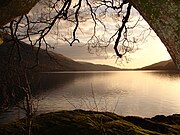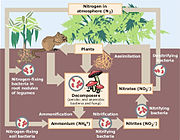Portal:Ecology
| |
|
|
Ecology
|
|
Ecology (from Ancient Greek οἶκος (oîkos) 'house', and -λογία (-logía) 'study of') is the natural science of the relationships among living organisms, including humans, and their physical environment. Ecology considers organisms at the individual, population, community, ecosystem, and biosphere levels. Ecology overlaps with the closely related sciences of biogeography, evolutionary biology, genetics, ethology, and natural history. Ecology is a branch of biology, and is the study of abundance, biomass, and distribution of organisms in the context of the environment. It encompasses life processes, interactions, and adaptations; movement of materials and energy through living communities; successional development of ecosystems; cooperation, competition, and predation within and between species; and patterns of biodiversity and its effect on ecosystem processes. Ecology has practical applications in conservation biology, wetland management, natural resource management (agroecology, agriculture, forestry, agroforestry, fisheries, mining, tourism), urban planning (urban ecology), community health, economics, basic and applied science, and human social interaction (human ecology). The word ecology (German: Ökologie) was coined in 1866 by the German scientist Ernst Haeckel. The science of ecology as we know it today began with a group of American botanists in the 1890s. Evolutionary concepts relating to adaptation and natural selection are cornerstones of modern ecological theory. Ecosystems are dynamically interacting systems of organisms, the communities they make up, and the non-living (abiotic) components of their environment. Ecosystem processes, such as primary production, nutrient cycling, and niche construction, regulate the flux of energy and matter through an environment. Ecosystems have biophysical feedback mechanisms that moderate processes acting on living (biotic) and abiotic components of the planet. Ecosystems sustain life-supporting functions and provide ecosystem services like biomass production (food, fuel, fiber, and medicine), the regulation of climate, global biogeochemical cycles, water filtration, soil formation, erosion control, flood protection, and many other natural features of scientific, historical, economic, or intrinsic value. (Full article...)
The World Geographical Scheme for Recording Plant Distributions (WGSRPD) is a biogeographical system developed by the international Biodiversity Information Standards (TDWG) organization, formerly the International Working Group on Taxonomic Databases. The WGSRPD standards, like other standards for data fields in botanical databases, were developed to promote "the wider and more effective dissemination of information about the world's heritage of biological organisms for the benefit of the world at large". The system provides clear definitions and codes for recording plant distributions at four scales or levels, from "botanical continents" down to parts of large countries. The codes may be referred to as TDWG geographical codes. Current users of the system include the International Union for Conservation of Nature (IUCN), the Germplasm Resources Information Network (GRIN), and Plants of the World Online (POWO). (Full article...)
 Credit: U.S. Navy Three polar bears approach the USS Honolulu (SSN-718), 280 miles from the North Pole. Polar bears have adapted through the process of evolution to have white fur that matches the white, icy arctic tundra.
The following are images from various ecology-related articles on Wikipedia.
Entries here consist of Good and Featured articles, which meet a core set of high editorial standards.
 Aposematism is the advertising by an animal, whether terrestrial or marine, to potential predators that it is not worth attacking or eating. This unprofitability may consist of any defenses which make the prey difficult to kill and eat, such as toxicity, venom, foul taste or smell, sharp spines, or aggressive nature. These advertising signals may take the form of conspicuous coloration, sounds, odours, or other perceivable characteristics. Aposematic signals are beneficial for both predator and prey, since both avoid potential harm. The term was coined in 1877 by Edward Bagnall Poulton for Alfred Russel Wallace's concept of warning coloration. Aposematism is exploited in Müllerian mimicry, where species with strong defences evolve to resemble one another. By mimicking similarly coloured species, the warning signal to predators is shared, causing them to learn more quickly at less of a cost. (Full article...)
Additional News Highlights
The American Naturalist is a monthly scientific journal that was founded in 1867 and is associated with the American Society of Naturalists. It is published by the University of Chicago Press. The journal covers ecology, evolutionary biology, population, and integrative biology research. (Full article...) The following Wikimedia Foundation sister projects provide more on this subject:
Discover Wikipedia using portals |













































